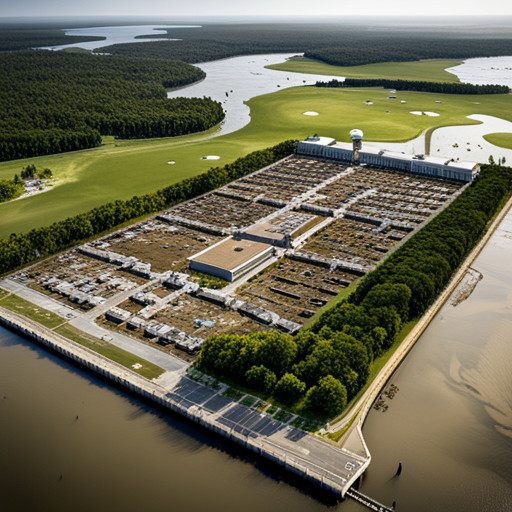Camp Lejeune Water Contamination Health Effects and Legal Actions
Like a silent enemy, water contamination at Camp Lejeune has wreaked havoc on the health of residents. This article explores the pernicious effects of benzene contamination, tracing its roots to underground leaks and improper disposal.

Attention is given to the Camp Lejeune Justice Act and its role in providing compensation for survivors. The piece also discusses recent lawsuits, potential links to Parkinson's disease, and the role of legal representation in these complex claims.
Key Takeaways
- Benzene contamination in Camp Lejeune water poses significant health risks, including leukemia, bone marrow damage, and reproductive organ problems.
- The contamination is primarily caused by benzene leaks from underground storage tanks, improper disposal of hazardous materials, fuel leaks, and the use of industrial solvents.
- The Camp Lejeune Justice Act allows survivors to seek substantial compensation for injuries related to the water contamination.
- Recent news highlights the increased risk of cancer, Parkinson's disease, and other health issues associated with Camp Lejeune water contamination.
Understanding the Benzene Contamination in Camp Lejeune Water

Benzene, a prevalent chemical contaminant in Camp Lejeune water, is associated with a range of health effects. These effects include confusion, convulsions, dizziness, and an increased risk of leukemia. These health risks result from damage to the bone marrow.
This contamination is attributed to leaks from underground storage tanks and improper disposal of hazardous waste.
The prevalence of benzene in drinking water not only threatens immediate health effects, but also long-term conditions such as cancer. The International Agency for Research on Cancer classifies benzene as a carcinogen, underscoring the health risks of benzene exposure.
Regular ingestion or inhalation of benzene can lead to bone marrow damage, reproductive issues, and cancer.
Therefore, the contamination of Camp Lejeune water with benzene poses significant health risks.
Identifying the Sources of Water Contamination at Camp Lejeune

Underground storage tanks, hazardous waste sites, and improper disposal of materials are among the key contributors to the pollution of the aquatic environment in the discussed military base. These pollution sources have led to significant water contamination at Camp Lejeune, causing potential legal actions and long term health effects.
The primary sources of contamination include:
- Benzene leaks from underground storage tanks and hazardous waste sites
- Improper disposal of hazardous materials in unlined landfills and burn pits
- Fuel leaks from underground storage tanks
- Industrial solvents used for maintaining military equipment
- Firefighting foam containing PFAS, a group of man-made chemicals that persist in the environment and in the human body
The contamination has led to health risks and instigated legal actions to address the issue.
The Role of the Camp Lejeune Justice Act in Compensating Survivors

Enactment of the Justice Act has provided a legal avenue for survivors associated with Camp Lejeune military base to seek compensation for adverse health outcomes believed to be linked to environmental pollution. The Act opens up opportunities for survivors to file claims and seek substantial lump-sum monetary compensations.
| Key Provision | Description |
|---|---|
| Eligibility | Survivors of people who served at Camp Lejeune between 1953 and 1987 |
| Compensation | Substantial lump-sum monetary compensation |
| Legal Assistance | Camp Lejeune water attorneys can expedite claim processing |
| Accountability | US government may be held responsible for the water contamination and resulting injuries |
This reflects the government's recognition of the health crisis caused by water contamination and is a significant step towards justice for survivors. Camp Lejeune Justice Act compensation serves as a significant legal action for survivors.
An Update on the Recent Camp Lejeune Water Lawsuits

Recent lawsuit developments reveal a trend towards increased recognition of the harm caused by environmental pollution at a prominent military base. Survivors of benzene exposure have begun receiving compensations, with bellwether trials potentially setting the stage for future compensation payouts. The focus is on the Camp Lejeune water lawsuit outcomes as evidence of the long-term health effects of benzene exposure in Camp Lejeune residents.
The health impact of benzene exposure is profoundly detrimental, and survivors' experiences are being shared to raise awareness. Bellwether trials are setting precedents for compensation payouts, providing hope for other victims seeking justice. Legal provisions, like the Camp Lejeune Justice Act, are facilitating justice and ensuring accountability for the military base's environmental pollution. These developments signify a growing acknowledgment of the base's responsibility for the harm caused by benzene exposure.
The Connection Between Parkinson’s Disease and Camp Lejeune Water Contamination

Studies suggest a potential link between the onset of Parkinson's disease and exposure to benzene-laden water in certain military base environments. This connection, a focus of ongoing Parkinson's disease research, is particularly apparent in the case of Camp Lejeune, where a significant number of residents have reported long term health effects.
| Risk Factor | Possible Consequence | Evidence Source |
| Benzene Exposure | Increased Incidence of Parkinson's | Epidemiological Studies |
| Military Base Environment | Increased Risk of Neurological Disorders | Case Studies of Camp Lejeune |
| Long Term Exposure | Cumulative Health Effects | Longitudinal Health Records |
These findings underscore the importance of addressing environmental hazards in military bases as part of a comprehensive approach to health and safety. Further research is required to accurately quantify these risks and devise effective strategies for prevention and mitigation.
Details About the Legal Representation for Camp Lejeune Justice Act Claims

Legal assistance is offered for survivors navigating the complex claims process under the Camp Lejeune Justice Act.
These firm's expertise encompasses pharmaceutical and medical device litigation, relevant in cases of contamination-induced health issues.
Specialized legal knowledge extends to federal law tort claims under the Act.
Lawyers at these law firms are often licensed across multiple states, broadening the reach for potential clients.
The Impact of Contamination on the Health of Camp Lejeune Residents

Exposure to benzene, a prevalent chemical in the locale's water supply, has been associated with a variety of adverse health outcomes including confusion, convulsions, and an increased risk of leukemia. These long term health effects have profound social consequences, often leading to decreased quality of life and increased healthcare costs for affected individuals.
The damage to bone marrow, reproductive organ problems, and increased risk of cancer underscore the seriousness of this contamination issue. Furthermore, there is the potential for generational effects, with children born in this area possibly having an increased risk of developing certain types of cancer.
Thus, the benzene contamination at Camp Lejeune has far-reaching implications, affecting not just individual health but also the broader social fabric.
Frequently Asked Questions
What Long-Term Health Monitoring Is Available for Individuals Exposed to the Camp Lejeune Water Contamination?
Long-term health monitoring for individuals exposed to benzene contamination includes regular screenings for leukemia and bone marrow damage. Compensation and legal recourse are available under the Camp Lejeune Justice Act for survivors affected by this exposure.
Are There Any Initiatives in Place to Clean up the Contamination at Camp Lejeune?
Efforts are indeed underway to address the contamination impact at Camp Lejeune. These remediation strategies include removing hazardous materials, treating polluted water, and monitoring ongoing pollution to prevent further environmental and health damage.
How Did the Contamination at Camp Lejeune First Come to Light?
The contamination at Camp Lejeune was initially revealed via whistleblowers, whose actions significantly influenced the subsequent investigation. Their disclosure initiated a comprehensive examination of the site, leading to the identification of multiple harmful contaminants.
Has the Water Contamination Issue at Camp Lejeune Led to Any Changes in Military Environmental Regulations or Policies?
The water contamination issue at Camp Lejeune has indeed prompted regulatory revisions and significant policy impact, leading to stricter environmental regulations and policies within military installations to prevent similar public health crises in the future.
Can Family Members of Deceased Veterans Who Were Stationed at Camp Lejeune Also File for Compensation?
Under the Camp Lejeune Justice Act, survivors of deceased veterans who were stationed at Camp Lejeune are eligible to file for compensation. This provision extends the scope of Compensation Eligibility to include Survivor Benefits.

This post has been generated by AI and was not reviewed by editors. This is Not legal advice. Please consult with an attorney.




